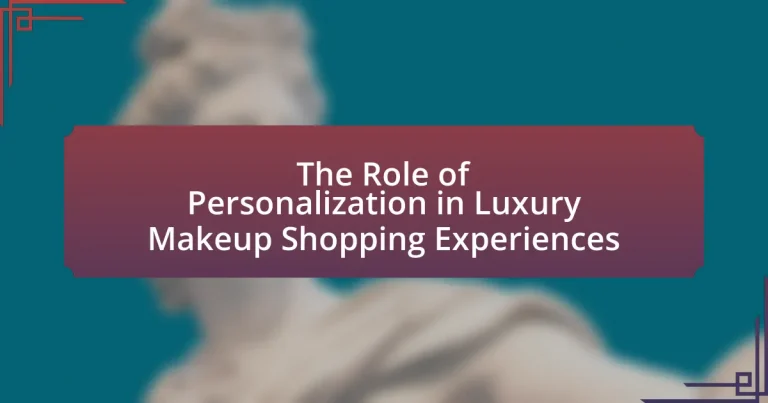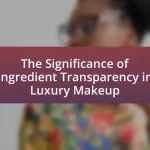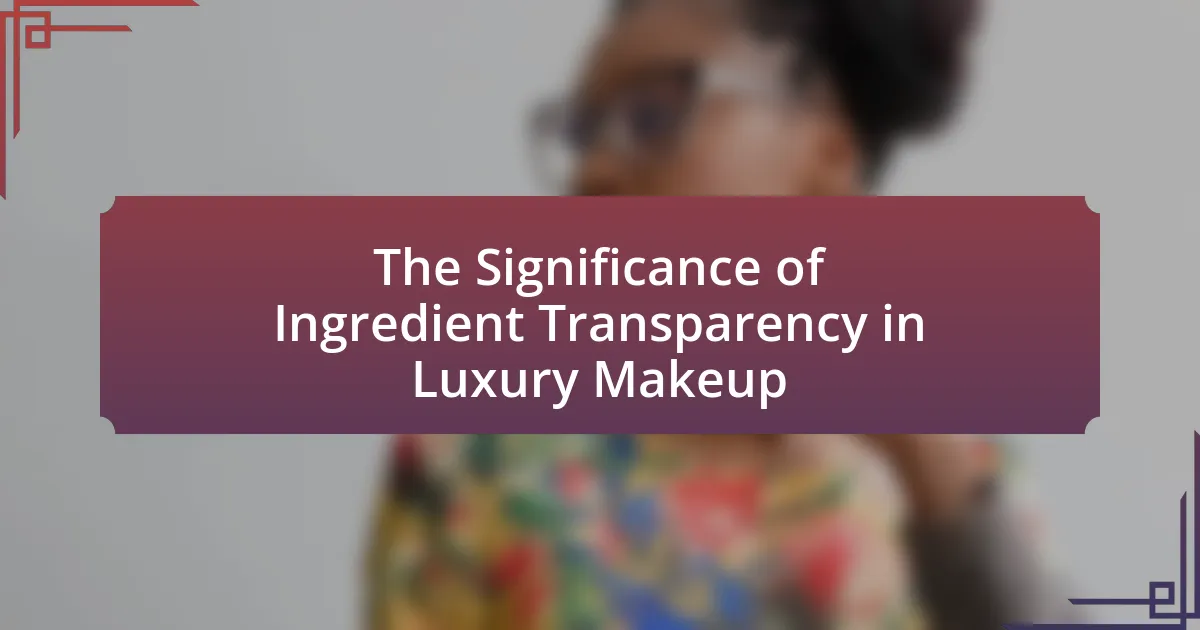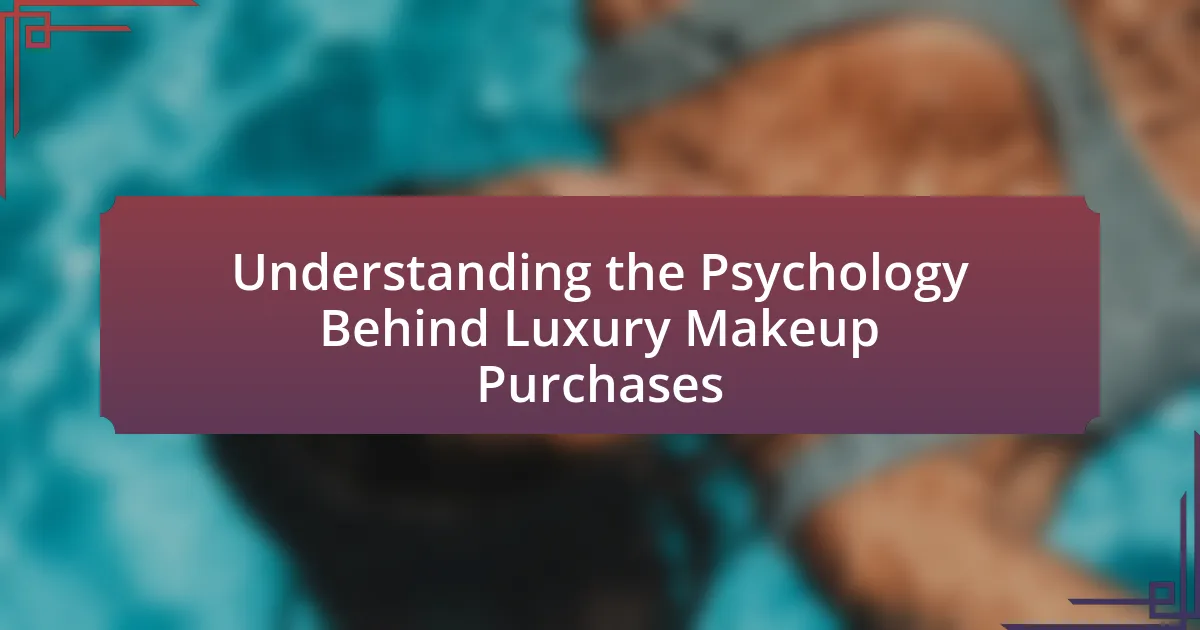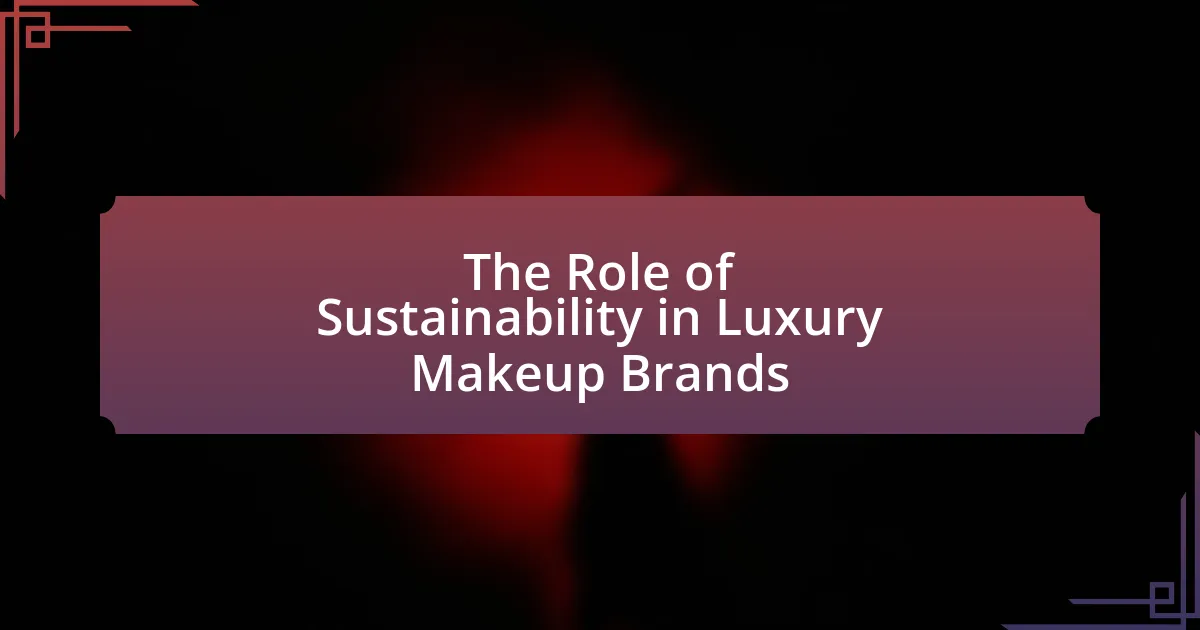The article focuses on the critical role of personalization in luxury makeup shopping experiences, emphasizing its impact on customer satisfaction and loyalty. It highlights how tailored recommendations, customized packaging, and personalized consultations enhance the shopping journey, leading to increased sales and brand advocacy. Key trends driving demand for personalized experiences, such as advancements in technology and evolving consumer preferences, are discussed, along with strategies luxury brands employ to collect data and ensure privacy. The article also addresses challenges faced by brands in implementing personalization and outlines best practices for enhancing customer engagement in the luxury makeup sector.
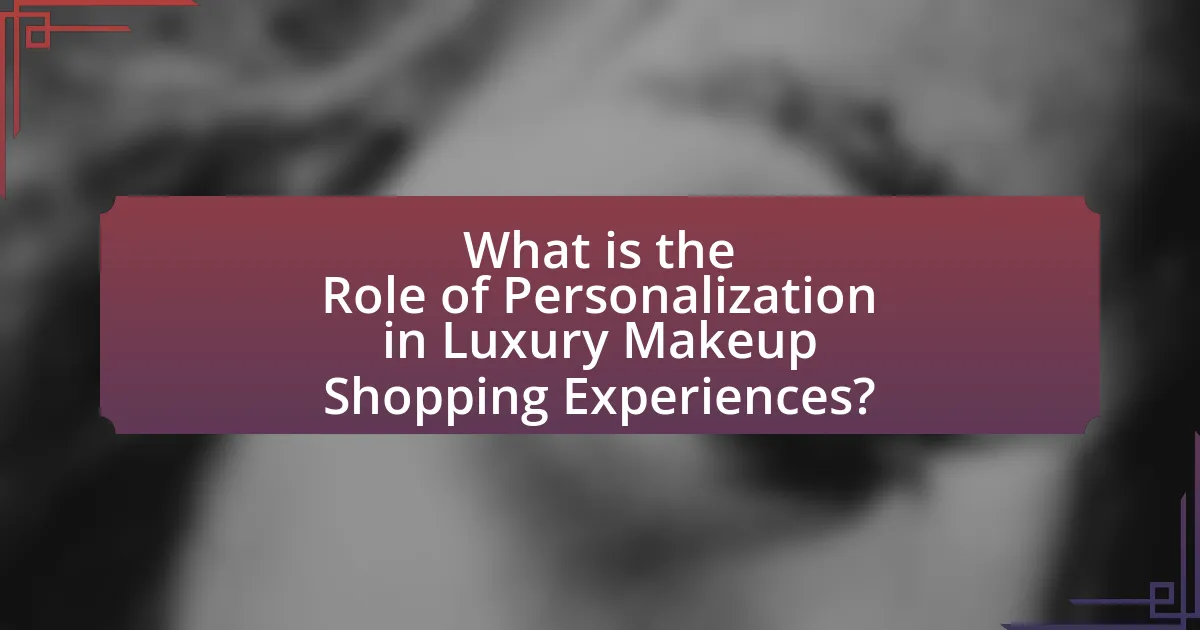
What is the Role of Personalization in Luxury Makeup Shopping Experiences?
Personalization plays a crucial role in luxury makeup shopping experiences by enhancing customer satisfaction and loyalty. Tailored recommendations based on individual preferences, skin types, and previous purchases create a unique shopping journey that resonates with consumers. According to a study by McKinsey & Company, personalized experiences can lead to a 10-30% increase in customer satisfaction and a significant boost in sales. This data underscores the importance of personalization in fostering deeper connections between luxury brands and their clientele, ultimately driving repeat purchases and brand advocacy.
How does personalization enhance the luxury makeup shopping experience?
Personalization enhances the luxury makeup shopping experience by tailoring product recommendations and services to individual customer preferences and needs. This approach fosters a deeper emotional connection between the brand and the consumer, leading to increased customer satisfaction and loyalty. For instance, luxury brands often utilize data analytics to understand customer behavior, allowing them to offer customized product selections, exclusive offers, and personalized consultations. Research indicates that 80% of consumers are more likely to make a purchase when brands offer personalized experiences, demonstrating the effectiveness of personalization in driving sales and enhancing the overall shopping experience.
What specific aspects of personalization are most impactful in luxury makeup?
The most impactful aspects of personalization in luxury makeup include tailored product recommendations, customized packaging, and personalized consultations. Tailored product recommendations enhance customer satisfaction by aligning products with individual skin types, preferences, and trends, which is supported by a study from McKinsey indicating that personalized experiences can increase customer loyalty by up to 20%. Customized packaging adds a unique touch that resonates with consumers’ desires for exclusivity, as evidenced by brands like Dior offering bespoke packaging options. Personalized consultations, whether in-store or online, allow for deeper engagement and understanding of customer needs, leading to higher conversion rates, as reported by a survey from Bain & Company showing that personalized services can boost sales by 10-30%.
How do consumers perceive personalized experiences in luxury makeup shopping?
Consumers perceive personalized experiences in luxury makeup shopping as highly valuable and enhancing their overall satisfaction. Research indicates that personalization fosters a sense of exclusivity and connection, leading to increased brand loyalty. A study by McKinsey & Company found that 71% of consumers expect companies to deliver personalized interactions, and 76% become frustrated when this does not happen. This expectation is particularly pronounced in the luxury sector, where tailored experiences can significantly influence purchasing decisions and brand perception.
Why is personalization important in the luxury makeup market?
Personalization is crucial in the luxury makeup market because it enhances customer satisfaction and loyalty by providing tailored experiences that meet individual preferences. Luxury consumers often seek unique products that reflect their personal style and identity, making personalized offerings more appealing. According to a study by McKinsey & Company, 71% of consumers expect companies to deliver personalized interactions, and this expectation is even higher in the luxury sector, where exclusivity and individuality are paramount. Personalization not only drives sales but also fosters deeper emotional connections between brands and consumers, ultimately leading to increased brand loyalty and repeat purchases.
What trends are driving the demand for personalized luxury makeup experiences?
The demand for personalized luxury makeup experiences is driven by several key trends, including the rise of consumer expectations for tailored products, advancements in technology, and the growing influence of social media. Consumers increasingly seek unique products that reflect their individual identities, leading brands to offer customizable options. Technological innovations, such as augmented reality and AI-driven recommendations, enhance the shopping experience by allowing customers to visualize products on themselves before purchase. Additionally, social media platforms amplify the desire for personalized experiences, as influencers showcase bespoke makeup looks, encouraging followers to seek similar tailored offerings. These trends collectively underscore the importance of personalization in the luxury makeup market.
How does personalization influence customer loyalty in luxury makeup brands?
Personalization significantly enhances customer loyalty in luxury makeup brands by creating tailored experiences that resonate with individual preferences. When luxury makeup brands utilize personalized marketing strategies, such as customized product recommendations and exclusive offers based on customer data, they foster a deeper emotional connection with consumers. Research indicates that 80% of consumers are more likely to make a purchase when brands offer personalized experiences, highlighting the effectiveness of this approach in driving loyalty. Additionally, luxury brands that engage customers through personalized communication and bespoke services often see increased repeat purchases, as customers feel valued and understood. This connection is crucial in the luxury sector, where brand loyalty is heavily influenced by the perceived exclusivity and personal attention provided to consumers.
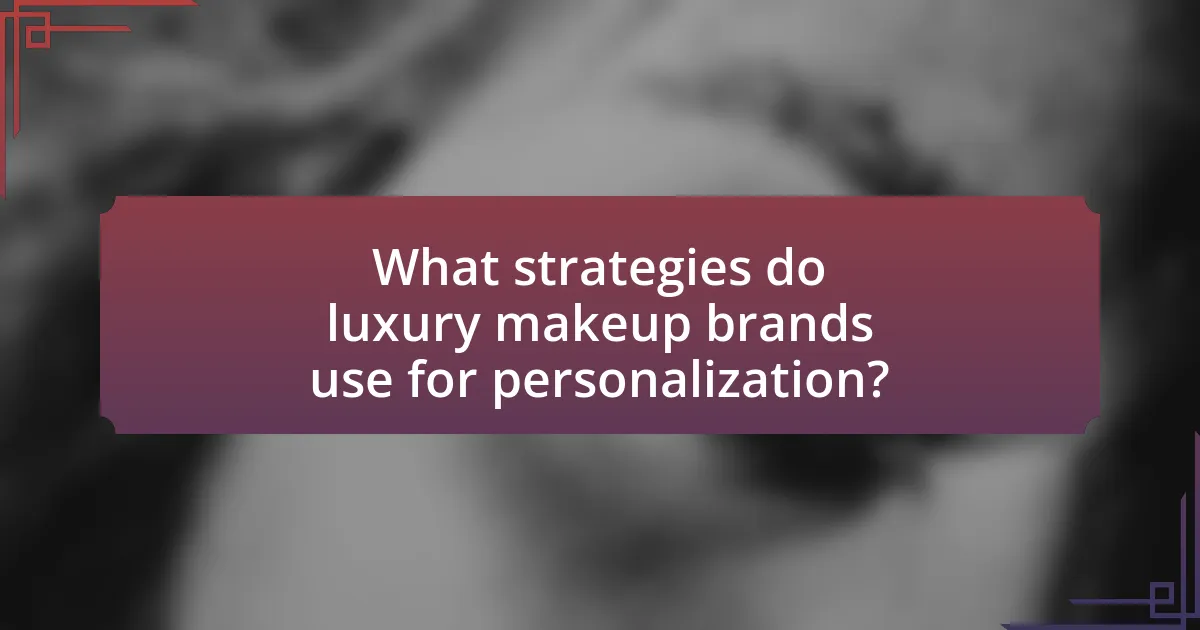
What strategies do luxury makeup brands use for personalization?
Luxury makeup brands utilize several strategies for personalization, including customized product offerings, data-driven recommendations, and exclusive customer experiences. Customized product offerings allow brands to create tailored products based on individual preferences, such as skin tone and texture, enhancing customer satisfaction. Data-driven recommendations leverage customer data and AI algorithms to suggest products that align with personal preferences and past purchases, increasing the likelihood of conversion. Exclusive customer experiences, such as personalized consultations and bespoke services, foster a deeper emotional connection between the brand and the consumer, reinforcing brand loyalty. These strategies are supported by industry trends indicating that personalized marketing can lead to a 20% increase in sales, demonstrating the effectiveness of these approaches in luxury makeup.
How do brands collect data to personalize shopping experiences?
Brands collect data to personalize shopping experiences through various methods, including online tracking, customer surveys, and purchase history analysis. Online tracking involves cookies and web analytics tools that monitor user behavior on websites, allowing brands to understand preferences and tailor recommendations. Customer surveys gather direct feedback about preferences and experiences, enabling brands to refine their offerings. Additionally, analyzing purchase history helps brands identify trends and suggest products that align with individual customer interests. According to a report by McKinsey, personalized experiences can lead to a 10-30% increase in revenue, highlighting the effectiveness of these data collection methods in enhancing customer engagement and satisfaction.
What technologies are utilized for data collection in luxury makeup shopping?
Technologies utilized for data collection in luxury makeup shopping include customer relationship management (CRM) systems, artificial intelligence (AI) algorithms, and mobile applications. CRM systems gather customer data such as purchase history and preferences, enabling brands to tailor marketing strategies. AI algorithms analyze consumer behavior and trends, providing insights that help in personalizing product recommendations. Mobile applications facilitate real-time data collection through user interactions, allowing brands to enhance the shopping experience based on individual customer needs. These technologies collectively enhance personalization, which is crucial in luxury makeup shopping.
How do brands ensure data privacy while personalizing experiences?
Brands ensure data privacy while personalizing experiences by implementing robust data protection measures and transparent privacy policies. These measures include data encryption, anonymization techniques, and compliance with regulations such as the General Data Protection Regulation (GDPR), which mandates that brands obtain explicit consent from users before collecting personal data. Additionally, brands often provide users with clear options to manage their data preferences, allowing them to opt-in or opt-out of data collection. This approach not only safeguards consumer information but also builds trust, as evidenced by a 2021 survey indicating that 86% of consumers are concerned about data privacy, highlighting the importance of these practices in maintaining customer loyalty in the luxury makeup sector.
What role does customer feedback play in personalization strategies?
Customer feedback is essential in shaping personalization strategies by providing insights into consumer preferences and behaviors. This feedback allows brands to tailor their offerings, ensuring that products and services align with customer expectations. For instance, a study by McKinsey & Company found that companies leveraging customer feedback in their personalization efforts can achieve up to 10-30% increases in revenue. By analyzing feedback, brands can identify trends, enhance product recommendations, and improve customer satisfaction, ultimately leading to a more engaging luxury makeup shopping experience.
How can brands effectively gather and analyze customer feedback?
Brands can effectively gather and analyze customer feedback by utilizing multiple channels such as surveys, social media, and direct customer interactions. Surveys, particularly those designed with specific questions about customer experiences and preferences, yield quantitative data that can be analyzed for trends. Social media platforms allow brands to monitor customer sentiments in real-time, providing qualitative insights into customer opinions and behaviors. Direct interactions, such as in-store conversations or customer service engagements, offer immediate feedback that can be documented and categorized for further analysis.
Research indicates that companies employing a multi-channel approach to feedback collection see a 20% increase in actionable insights compared to those using a single method. Additionally, tools like sentiment analysis software can process large volumes of feedback data, identifying key themes and areas for improvement. This combination of quantitative and qualitative analysis enables brands to tailor their offerings and enhance the personalization of luxury makeup shopping experiences.
What are the best practices for implementing feedback into personalization efforts?
The best practices for implementing feedback into personalization efforts include actively collecting customer insights, analyzing data for trends, and continuously refining personalization strategies based on that feedback. Actively collecting insights can be achieved through surveys, reviews, and direct customer interactions, which provide valuable information on preferences and experiences. Analyzing this data allows businesses to identify patterns and adjust their offerings accordingly, ensuring that personalization aligns with customer expectations. Continuous refinement is crucial, as it enables brands to adapt to changing consumer behaviors and preferences, ultimately enhancing the luxury makeup shopping experience. For instance, a study by McKinsey & Company found that companies that effectively use customer feedback can increase customer satisfaction by up to 20%.
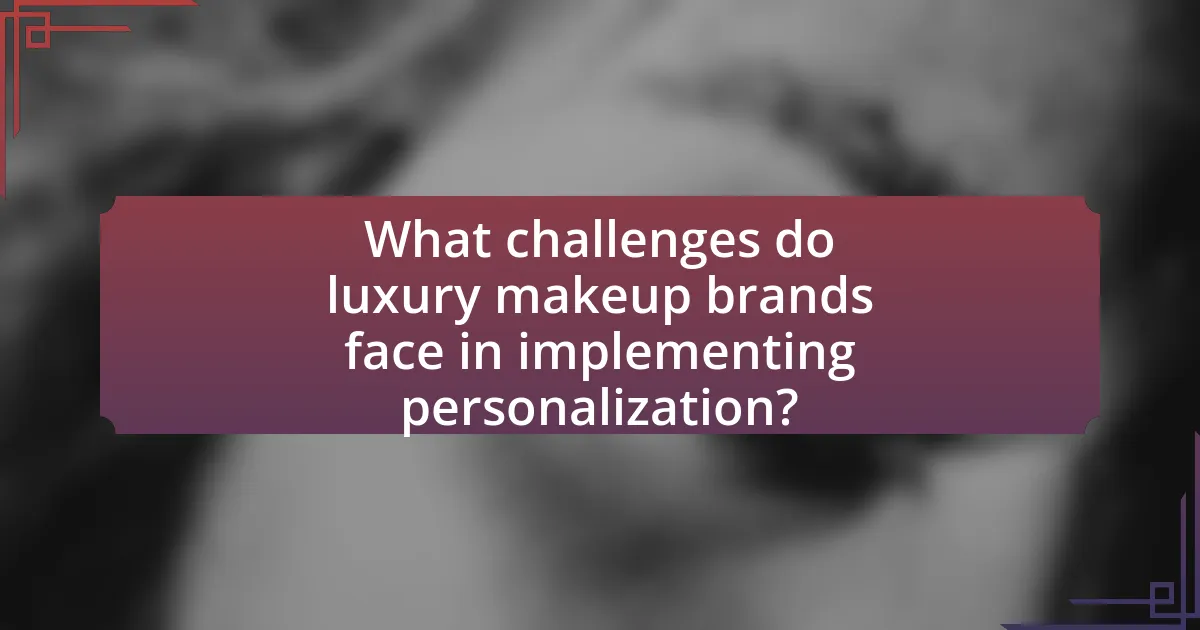
What challenges do luxury makeup brands face in implementing personalization?
Luxury makeup brands face significant challenges in implementing personalization, primarily due to data privacy concerns, high customer expectations, and the complexity of integrating technology. Data privacy regulations, such as GDPR, restrict how brands can collect and use customer data, making it difficult to tailor experiences without infringing on privacy rights. Additionally, luxury consumers often expect highly customized products and services, which can be challenging to deliver consistently across diverse customer segments. Furthermore, integrating advanced technologies like AI and machine learning into existing systems requires substantial investment and expertise, complicating the personalization process. These factors collectively hinder luxury makeup brands from effectively leveraging personalization to enhance customer experiences.
How do brands overcome the barriers to effective personalization?
Brands overcome the barriers to effective personalization by leveraging advanced data analytics and customer insights to tailor experiences. By utilizing customer data, brands can segment their audience and create targeted marketing strategies that resonate with individual preferences. For instance, a study by McKinsey found that personalized marketing can lead to a 10-30% increase in revenue, demonstrating the financial benefits of effective personalization. Additionally, brands invest in technology such as AI and machine learning to enhance their understanding of customer behavior, allowing for real-time adjustments to marketing strategies. This approach not only improves customer satisfaction but also fosters brand loyalty, as consumers feel more valued and understood.
What are the common pitfalls in personalization strategies for luxury makeup?
Common pitfalls in personalization strategies for luxury makeup include over-reliance on data, lack of emotional connection, and insufficient understanding of customer preferences. Over-reliance on data can lead to generic recommendations that fail to resonate with individual customers, as personalization should balance data insights with human intuition. A lack of emotional connection can result in a transactional experience rather than a meaningful one, which is crucial in the luxury market where brand loyalty is often driven by emotional engagement. Additionally, insufficient understanding of customer preferences can lead to misaligned product offerings, as luxury consumers often seek unique and tailored experiences that reflect their personal style and values. These pitfalls can hinder the effectiveness of personalization efforts and ultimately impact customer satisfaction and brand loyalty in the luxury makeup sector.
How can brands measure the success of their personalization efforts?
Brands can measure the success of their personalization efforts through key performance indicators (KPIs) such as customer engagement rates, conversion rates, and customer satisfaction scores. For instance, an increase in engagement rates, such as time spent on site or interaction with personalized content, indicates that customers find the personalized experiences valuable. Additionally, tracking conversion rates before and after implementing personalization strategies can reveal the effectiveness of these efforts in driving sales. Research by McKinsey shows that personalized marketing can lead to a 10-30% increase in sales, providing concrete evidence of the impact of successful personalization. Furthermore, customer satisfaction surveys can provide direct feedback on how well personalization meets customer expectations, allowing brands to refine their strategies accordingly.
What future trends can we expect in personalization for luxury makeup shopping?
Future trends in personalization for luxury makeup shopping will increasingly focus on advanced AI-driven technologies and data analytics to create tailored shopping experiences. Brands are expected to leverage machine learning algorithms to analyze customer preferences, skin types, and purchase history, enabling them to offer personalized product recommendations and virtual try-ons. For instance, a report by McKinsey highlights that 71% of consumers expect companies to deliver personalized interactions, indicating a strong demand for customized experiences in luxury markets. Additionally, augmented reality (AR) will play a significant role, allowing customers to visualize products on themselves before purchase, enhancing the personalization aspect. As luxury brands adopt these technologies, they will likely see improved customer satisfaction and loyalty, reinforcing the importance of personalization in their shopping experiences.
How will advancements in technology shape the future of personalized luxury makeup experiences?
Advancements in technology will significantly enhance personalized luxury makeup experiences by enabling tailored product recommendations and virtual try-on solutions. Technologies such as artificial intelligence and augmented reality allow brands to analyze individual customer preferences and skin types, leading to customized product offerings. For instance, AI algorithms can assess user data from previous purchases and social media interactions to suggest products that align with personal styles and needs. Additionally, augmented reality applications enable customers to virtually apply makeup, providing a realistic preview of how products will look on their skin, thus improving the shopping experience. According to a report by McKinsey, 70% of consumers are more likely to purchase a product if they can try it virtually, highlighting the effectiveness of these technological advancements in driving sales and customer satisfaction in the luxury makeup sector.
What emerging consumer preferences should brands consider for future personalization?
Emerging consumer preferences that brands should consider for future personalization include a strong demand for sustainability, inclusivity, and technology integration. Consumers increasingly prefer brands that demonstrate environmental responsibility, as evidenced by a 2021 survey indicating that 66% of global consumers are willing to pay more for sustainable products. Additionally, inclusivity in product offerings, such as diverse shade ranges and gender-neutral marketing, is becoming essential, with 70% of consumers stating they are more likely to purchase from brands that reflect their values. Furthermore, the integration of technology, such as augmented reality for virtual try-ons, enhances the shopping experience, with 61% of consumers expressing interest in using AR tools for makeup application. These preferences highlight the need for brands to adapt their personalization strategies to align with evolving consumer values and technological advancements.
What are the best practices for enhancing personalization in luxury makeup shopping?
The best practices for enhancing personalization in luxury makeup shopping include utilizing data analytics to understand customer preferences, offering tailored product recommendations, and providing personalized customer service. Data analytics enables brands to track purchasing behavior and preferences, allowing for customized marketing strategies that resonate with individual customers. Tailored product recommendations can be achieved through algorithms that suggest products based on past purchases and browsing history, enhancing the shopping experience. Personalized customer service, such as one-on-one consultations with beauty experts, further elevates the luxury experience by addressing specific customer needs and preferences. These practices are supported by research indicating that personalized experiences significantly increase customer satisfaction and loyalty in the luxury sector.
